初中英语形容词副词的比较级最高级大全(2)(最新整理)
- 格式:pdf
- 大小:168.70 KB
- 文档页数:4
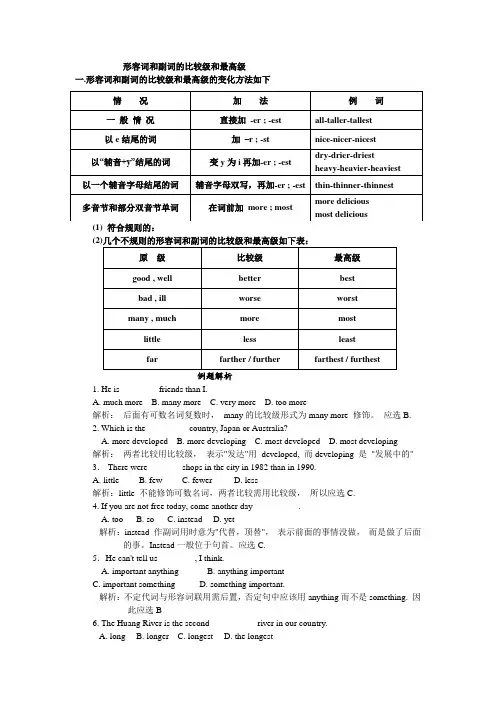
形容词和副词的比较级和最高级一.形容词和副词的比较级和最高级的变化方法如下(1) 符合规则的:例题解析1. He is ________ friends than I.A. much moreB. many moreC. very moreD. too more解析:后面有可数名词复数时,many的比较级形式为many more 修饰。
应选B.2. Which is the _________ country, Japan or Australia?A. more developedB. more developingC. most developedD. most developing解析:两者比较用比较级,表示"发达"用developed, 而developing 是"发展中的"3. There were _______ shops in the city in 1982 than in 1990.A. littleB. fewC. fewerD. less解析:little 不能修饰可数名词,两者比较需用比较级,所以应选C.4. If you are not free today, come another day __________.A. tooB. soC. insteadD. yet解析:instead 作副词用时意为"代替,顶替",表示前面的事情没做,而是做了后面的事。
Instead一般位于句首。
应选C.5.He can't tell us ________, I think.A. important anythingB. anything importantC. important somethingD. something important.解析:不定代词与形容词联用需后置,否定句中应该用anything而不是something. 因此应选B6. The Huang River is the second __________ river in our country.A. longB. longerC. longestD. the longest解析:"定冠词the+ 序数词+ 形容词最高级" 表示"第几大……" 应选C.7. The light in the office wasn't ________for him to read.A. enough brightB. bright enoughC. brightlyD. enough brightly解析:enough修饰名词时可前可后,修饰形容词或副词时,要后置。
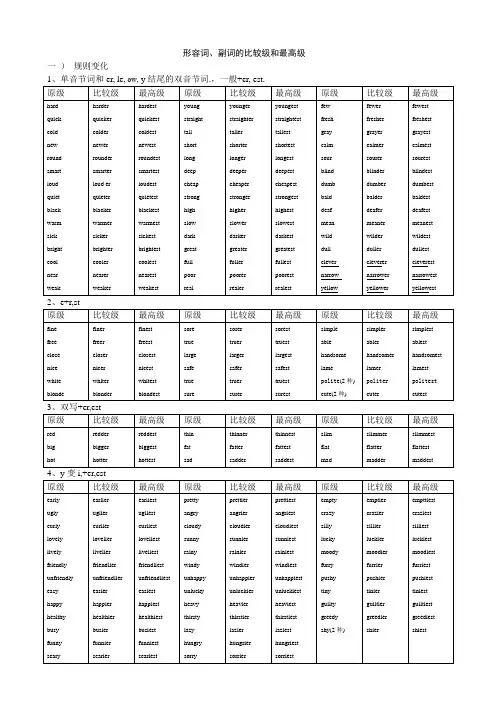
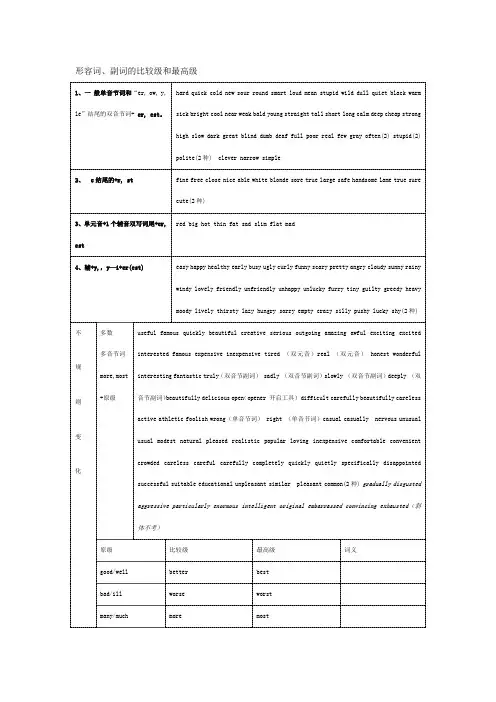
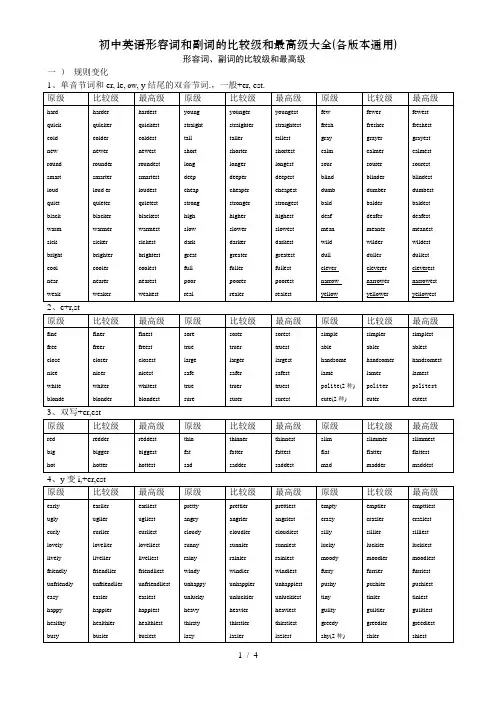
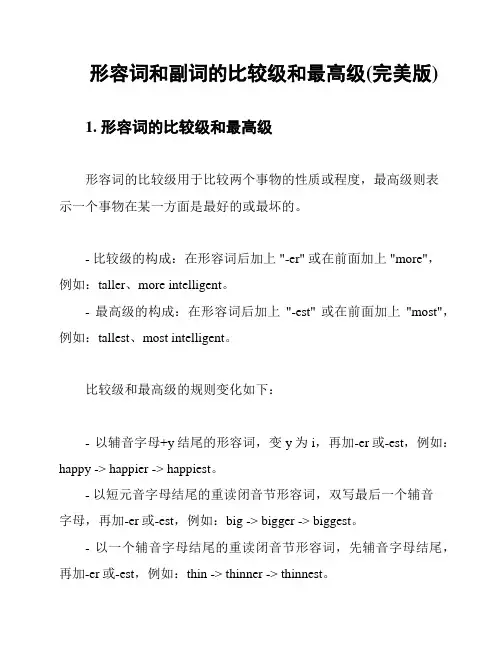
形容词和副词的比较级和最高级(完美版)1. 形容词的比较级和最高级形容词的比较级用于比较两个事物的性质或程度,最高级则表示一个事物在某一方面是最好的或最坏的。
- 比较级的构成:在形容词后加上 "-er" 或在前面加上 "more",例如:taller、more intelligent。
- 最高级的构成:在形容词后加上"-est" 或在前面加上"most",例如:tallest、most intelligent。
比较级和最高级的规则变化如下:- 以辅音字母+y结尾的形容词,变y为i,再加-er或-est,例如:happy -> happier -> happiest。
- 以短元音字母结尾的重读闭音节形容词,双写最后一个辅音字母,再加-er或-est,例如:big -> bigger -> biggest。
- 以一个辅音字母结尾的重读闭音节形容词,先辅音字母结尾,再加-er或-est,例如:thin -> thinner -> thinnest。
- 多音节和部分双音节形容词前加more或most,例如:beautiful -> more beautiful -> most beautiful。
2. 副词的比较级和最高级副词的比较级和最高级的构成方式与形容词类似,只是在形容词的基础上加上 "-ly" 构成副词。
- 比较级的构成:在副词后加上 "-er" 或在前面加上 "more",例如:faster、more quickly。
- 最高级的构成:在副词后加上 "-est" 或在前面加上 "most",例如:fastest、most quickly。
与形容词类似,副词的规则变化也遵循相同的规律。
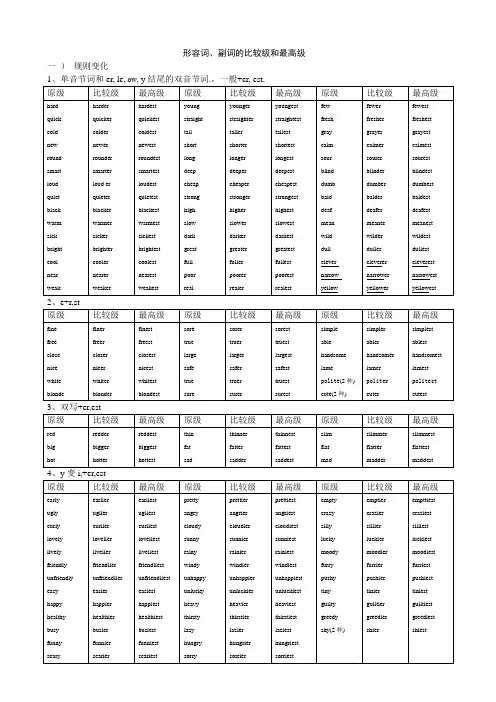

初中英语知识点归纳形容词和副词的比较级和最高级形容词和副词的比较级和最高级是初中英语中非常重要的知识点。
通过掌握这些知识,我们可以更准确地描述人、事、物的特征和程度。
本文将归纳总结形容词和副词的比较级和最高级的用法和变化规则。
一、形容词比较级和最高级1. 形容词的比较级比较级常用于两个事物之间的比较,表示一方在某一方面的程度要超过另一方。
(1)一般情况下,在形容词后面加上-er构成比较级形式。
例如:- Tom is taller than Jerry.(汤姆比杰瑞高。
)- The book is cheaper than the movie.(这本书比这部电影便宜。
)(2)以字母e结尾的形容词,直接加-r。
例如:- Kate is braver than her sister.(凯特比她妹妹更勇敢。
)(3)以辅音字母+y结尾的形容词,先把y变成i,再加-er。
例如:- This shirt is prettier than that one.(这件衬衫比那件更漂亮。
)(4)部分双音节和多音节形容词在前面加上more来构成比较级形式。
例如:- He is more intelligent than his classmates.(他比他的同学们更聪明。
)2. 形容词的最高级最高级用于三个或三个以上的事物之间的比较,表示一方在某一方面的程度是所有事物中最高的。
(1)在形容词后面加上-est构成最高级形式。
例如:- Alice is the tallest girl in the class.(艾丽斯是班上最高的女孩。
)- This is the cheapest phone I've ever seen.(这是我见过的最便宜的手机。
)(2)以字母e结尾的形容词,直接加-st。
例如:- It is the largest lake in the city.(这是城市里最大的湖。
)(3)以辅音字母+y结尾的形容词,先把y变成i,再加-est。
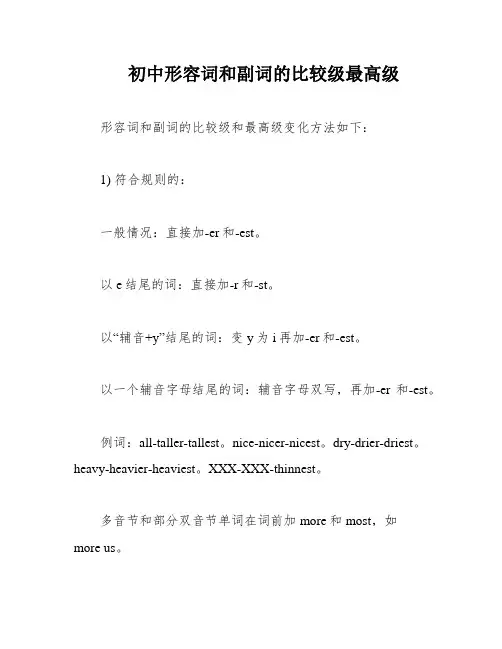
初中形容词和副词的比较级最高级形容词和副词的比较级和最高级变化方法如下:1) 符合规则的:一般情况:直接加-er和-est。
以e结尾的词:直接加-r和-st。
以“辅音+y”结尾的词:变y为i再加-er和-est。
以一个辅音字母结尾的词:辅音字母双写,再加-er和-est。
例词:all-taller-tallest。
nice-nicer-nicest。
dry-drier-driest。
heavy-heavier-heaviest。
XXX-XXX-thinnest。
多音节和部分双音节单词在词前加more和most,如more us。
2) 几个不规则的形容词和副词的比较级和最高级如下表:原级:good。
well。
bad。
ill。
many。
much。
little。
far比较级:better。
worse。
more。
less。
XXX最高级:XXX。
worst。
most。
least。
XXX形容词和副词比较级的用法:级别表达方式和意义例句原级 As+原级+as(像……一样) XXX。
不如……那样) She does not study so well as I do。
比较级比较级+than(比……) XXX XXX。
比较级前面可以加much。
far。
even。
still。
a lot。
a little。
a bit等。
I like pork better than beef。
程度加深比较级+and+比较级(越来越……) XXX。
The +比较级,the +比较级(越……,越……) XXX.The more books she reads。
the better her XXX the best season of the year。
Lin Tao jumped the farthest of all。
Note that the article "the" is often omitted before the XXX。
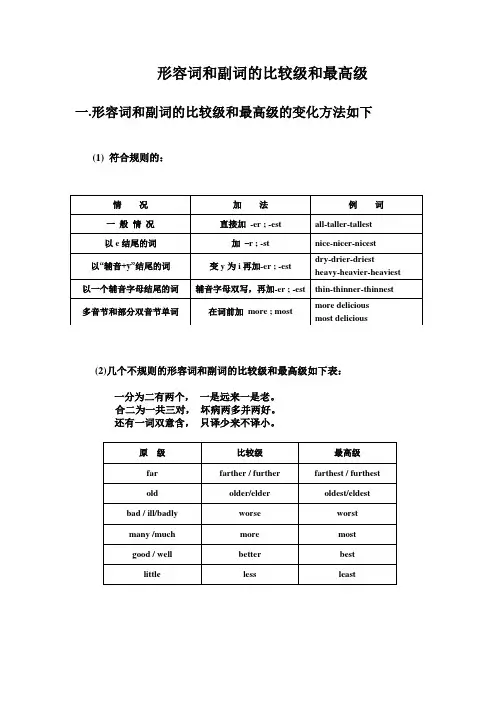
形容词和副词的比较级和最高级一.形容词和副词的比较级和最高级的变化方法如下(1) 符合规则的:(2)几个不规则的形容词和副词的比较级和最高级如下表:一分为二有两个,一是远来一是老。
合二为一共三对,坏病两多并两好。
还有一词双意含,只译少来不译小。
二.形容词和副词比较级的用法注意:有些形容词,如dead, empty, round, sure, woolen等受本身含义的限制,没有比较级。
例题解析1. He is ________ friends than I.A. much moreB. many moreC. very moreD. too more解析:后面有可数名词复数时,many的比较级形式为many more 修饰。
应选B.2. Which is the _________ country, Japan or Australia?A. more developedB. more developingC. most developedD. most developing解析:两者比较用比较级,表示"发达"用developed, 而developing 是"发展中的" 意思3. There were _______ shops in the city in 1982 than in 1990.A. littleB. fewC. fewerD. less解析:little 不能修饰可数名词,两者比较需用比较级,所以应选C.4. If you are not free today, come another day __________.A. tooB. soC. insteadD. yet解析:instead 作副词用时意为"代替,顶替",表示前面的事情没做,而是做了后面的事。
Instead一般位于句首。
应选C.5.He can't tell us ________, I think.A. important anythingB. anything importantC. important somethingD. something important.解析:不定代词与形容词联用需后置,否定句中应该用anything而不是something. 因此应选B6. The Huang River is the second __________ river in our country.A. longB. longerC. longestD. the longest解析:"定冠词the+ 序数词+ 形容词最高级" 表示"第几大……" 应选C.7. The light in the office wasn't ________for him to read.A. enough brightB. bright enoughC. brightlyD. enough brightly解析:enough修饰名词时可前可后,修饰形容词或副词时,要后置。
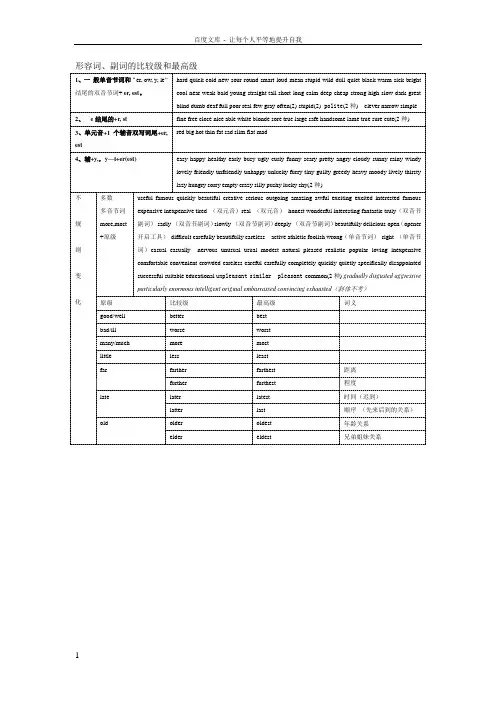
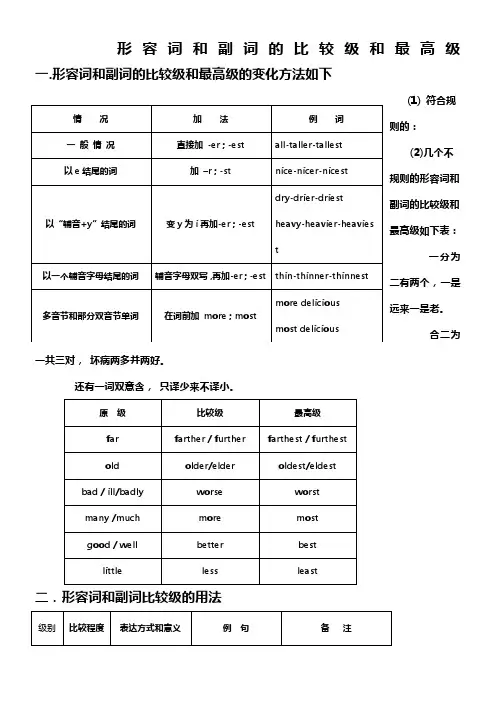
形容词和副词的比较级和最高级一.形容词和副词的比较级和最高级的变化方法如下(1) 符合规则的: (2)几个不规则的形容词和副词的比较级和最高级如下表: 一分为二有两个, 一是远来一是老。
合二为一共三对, 坏病两多并两好。
还有一词双意含, 只译少来不译小。
二.形容词和副词比较级的用法注意:有些形容词,如dead, empty, round, sure, woolen等受本身含义的限制,没有比较级。
例题解析1. He is ________ friends than I.A. much moreB. many moreC. very moreD. too more解析:后面有可数名词复数时,many的比较级形式为many more 修饰。
应选B.2. Which is the _________ country, Japan or Australia?A. more developedB. more developingC. most developedD. most developing解析:两者比较用比较级,表示"发达"用developed, 而developing 是"发展中的" 意思3. There were _______ shops in the city in 1982 than in 1990.A. littleB. fewC. fewerD. less解析:little 不能修饰可数名词,两者比较需用比较级,所以应选C.4. If you are not free today, come another day __________.A. tooB. soC. insteadD. yet解析:instead 作副词用时意为"代替,顶替",表示前面的事情没做,而是做了后面的事。
Instead一般位于句首。
应选C.5.He can't tell us ________, I think.A. important anythingB. anything importantC. important somethingD. something important.解析:不定代词与形容词联用需后置,否定句中应该用anything而不是something. 因此应选B6. The Huang River is the second __________ river in our country.A. longB. longerC. longestD. the longest解析:"定冠词the+ 序数词+ 形容词最高级" 表示"第几大……" 应选C.7. The light in the office wasn't ________for him to read.A. enough brightB. bright enoughC. brightlyD. enough brightly解析:enough修饰名词时可前可后,修饰形容词或副词时,要后置。
初中英语知识归纳形容词和副词的比较级和最高级构成形容词和副词是英语中常见的词性,用来修饰名词或者动词等。
比较级和最高级是形容词和副词构成的两种特殊形式,在句子中用来表达两个或多个事物之间的比较关系。
本文将对初中英语知识中的形容词和副词的比较级和最高级进行归纳和总结。
一、形容词的比较级和最高级构成方式1. 一般情况下,在形容词的原级后面加上"-er"构成比较级,加上"-est"构成最高级。
例如:原级:tall(高的)比较级:taller(更高的)最高级:tallest(最高的)2. 以"e"结尾的形容词,在原级后面只需加上"-r"和"-st"。
例如:原级:large(大的)比较级:larger(更大的)最高级:largest(最大的)3. 以辅音字母+y结尾的形容词,把"y"变为"i",再加上"-er"和"-est"。
例如:原级:happy(快乐的)比较级:happier(更快乐的)最高级:happiest(最快乐的)4. 以重读闭音节结尾,并且末尾只有一个辅音字母的形容词,要双写这个辅音字母,再加上"-er"和"-est"。
例如:原级:big(大的)比较级:bigger(更大的)最高级:biggest(最大的)5. 部分形容词的比较级和最高级是不规则的,需要特殊记忆。
例如:原级:good(好的)比较级:better(更好的)最高级:best(最好的)二、副词的比较级和最高级构成方式1. 大多数副词的比较级和最高级构成方式与形容词相同,在副词的原级后面加上"-er"和"-est"。
例如:原级:quickly(快速地)比较级:more quickly(更快地)最高级:most quickly(最快地)2. 以"e"结尾的副词,在原级后面只需加上"-r"和"-st"。
形容词、副词的比较级和最高级1、一般单音节词和“er, ow, y, le”结尾的双音节词+ er, est。
hard quick cold new sour round smart loud mean stupid wild dull quiet black warm sick bright cool near weak bald young straight tall short long calm deep cheap strong high slow dark great blind dumb deaf full poor real few gray often(2) stupid(2) polite(2 种) clever narrow simple2、e 结尾的+r, st fine free close nice able white blonde sore true large safe handsome lame true sure cute(2 种)3、单元音+1 个辅音双写词尾+er,estred big hot thin fat sad slim flat mad4、辅+y,,y—i+er(est) easy happy healthy early busy ugly curly funny scary pretty angry cloudy sunny rainy windylovely friendly unfriendly unhappy unlucky furry tiny guilty greedy heavy moody lively thirstylazy hungry sorry empty crazy silly pushy lucky shy(2 种)不规则变化多数多音节词more,most+原级useful famous quickly beautiful creative serious outgoing amazing awful exciting excited interested famousexpensive inexpensive tired (双元音)real (双元音)honest wonderful interesting fantastic truly(双音节副词)sadly (双音节副词)slowly (双音节副词)deeply (双音节副词)beautifully delicious open(opener 开启工具)difficult carefully beautifully careless active athletic foolish wrong(单音节词)right (单音节词)casual casually nervous unusual usual modest natural pleased realistic popular lovinginexpensive comfortable convenient crowded careless careful carefully completely quickly quietly specificallydisappointed successful suitable educational unpleasant similar pleasant common(2 种) graduallydisgusted aggressive particularly enormous intelligent original embarrassed convincing exhausted(斜体不考)原级比较级最高级词义good/well better bestbad/ill worse worstmany/much more mostlittle less leastfar farther farthest 距离further furthest 程度late later latest 时间(迟到)latter last 顺序(先来后到的关系)old older oldest 年龄关系elder eldest 兄弟姐妹关系形容词、副词的比较级和最高级的考试原形hard 比较级最高级原形carefully比较级最高级原形stupidwildmuchlittlefarlateoldsuccessfulunpleasantsimilarpleasantpolitecommongoodwellbadillmanyquietdeaffullpoorrealgrayoftenclevernarrowsimplefinetruecuteredhotfatslimmadeasyhappyhealthyamazing比较级最高级quick beautifully cold active nervous wrong unusual right usual round modest smart natural loud realistic short popular long loving calm inexpensive cheap comfortable strong convenient high crowded realnew honest sour wonderful warm interesting sick sadly bright slowly cool deeply near beautifully free interested close famous nice expensive able inexpensive white tiredsore delicious true openlarge difficult handsome dark careless early careful busy carefully ugly quickly curly quietly funny disappointed scary friendly pretty unfriendly angry unhappy cloudyunlucky sunny awful tiny lovely exciting heavy empty excited lively hungry lazy。
形容词、副词的比较级和最高级1、一般单音节词和“er, ow, y, le”结尾的双音节词+ er, est。
hard quick cold new sour round smart loud mean stupid wild dull quiet black warm sick bright cool near weak bald young straight tall short long calm deep cheap strong high slow dark great blind dumb deaf full poor real few gray often(2) stupid(2) polite(2种) clever narrow simple2、e结尾的+r, st fine free close nice able white blonde sore true large safe handsome lame true sure cute(2种)3、单元音+1个辅音双写词尾+er,estred big hot thin fat sad slim flat mad4、辅+y,,y—i+er(est) easy happy healthy early busy ugly curly funny scary pretty angry cloudy sunny rainy windylovely friendly unfriendly unhappy unlucky furry tiny guilty greedy heavy moody lively thirstylazy hungry sorry empty crazy silly pushy lucky shy(2种)不规则变化多数多音节词more,most+原级useful famous quickly beautiful creative serious outgoing amazing awful exciting excited interested famousexpensive inexpensive tired (双元音)real (双元音)honest wonderful interesting fantastic truly(双音节副词)sadly (双音节副词)slowly (双音节副词)deeply (双音节副词)beautifully delicious open(opener开启工具)difficult carefully beautifully careless active athletic foolish wrong(单音节词)right (单音节词)casual casually nervous unusual usual modest natural pleased realistic popular loving inexpensivecomfortable convenient crowded careless careful carefully completely quickly quietly specifically disappointedsuccessful suitable educational unpleasant similar pleasant common(2种) gradually disgusted aggressiveparticularly enormous intelligent original embarrassed convincing exhausted(斜体不考)原级比较级最高级词义good/well better bestbad/ill worse worstmany/much more mostlittle less leastfar farther farthest 距离further furthest 程度late later latest 时间(迟到)latter last 顺序(先来后到的关系)old older oldest 年龄关系elder eldest 兄弟姐妹关系形容词、副词的比较级和最高级的考试原形比较级最高级hardquickcoldnervousunusualusualmodestnaturalrealisticpopularlovinginexpensivecomfortableconvenientcrowdednewsourwarmsickbrightcoolnearfreecloseniceablewhitesoretruelargehandsomecarelesscarefulcarefullyquicklyquietlydisappointedfriendlyunfriendlyunhappyunlucky 原形比较级最高级carefullybeautifullyactivewrongrightroundsmartloudshortlongcalmcheapstronghighrealhonestwonderfulinterestingsadlyslowlydeeplybeautifullyinterestedfamousexpensiveinexpensivetireddeliciousopendifficultdark原形比较级最高级stupidwildmuchlittlefarlateoldsuccessfulunpleasantsimilarpleasantpolitecommongoodwellbadillmanyquietdeaffullpoorrealgrayoftenclevernarrowsimplefinetruecuteredhotfatslimmadeasyhappyhealthyamazingawfultiny heavy lively earlybusyuglycurlyfunnyscaryprettyangrycloudysunnylovelyemptyhungryexcitingexcitedlazy。